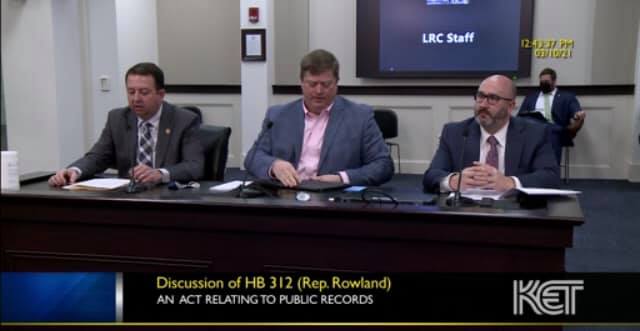
"Don't sweat the details."
That was the unspoken message lawmakers sent to the public on March 10 when they abruptly ended testimony opposing HB 312, a bill that alters the 45 year old open records laws.
https://apps.legislature.ky.gov/record/21rs/hb312.html
The Kentucky Open Government Coalition has expended considerable effort in attempting to alert the public to lawmakers' efforts to weaken those laws, and abridge the public's rights, since February 25.
https://www.facebook.com/419650175248377/posts/868945456985511/?d=n
https://www.facebook.com/419650175248377/posts/869329400280450/?d=n
That was the day a House committee heard a committee substitute to HB 312, "An act relating to financial institutions." The committee sub, among other things:
• established a residency requirement for use of the open records law;
• mandated the use of a standardized open records request form for all requests that was inconsistent with other parts of the laws; and
• insulated legislative branch denials of open records requests from judicial review.
One day after the committee sub was debated — a term we use loosely having watched it — and approved by the House, we prepared a letter detailing our objections.
A copy of that letter — which 60 plus organizations and individuals signed off on — was mailed to each Senator on March 2, and the most recently updated version was sent to Senate committee members on March 9.
https://www.facebook.com/419650175248377/posts/872997199913670/?d=n
But details appear to be the last thing lawmakers want. In the greatest of ironies, they have taken it upon themselves to "decide what is good for the public to know" and what is not good for the public to know.
https://www.casemine.com/judgement/us/59148c7eadd7b04934532f52
And that is very little.
This is what the public must know about HB 312.
• It will not achieve the stated goal of lifting the burden on public agencies of records requests from nonresident requesters. It may, in fact, increase that burden by imposing additional duties on agencies. It will also create obstructions not just for nonresidents but also for residents.
• The open records law already contains the solution to the problem HB 312 is purportedly aimed at addressing. KRS 61.872(6) authorizes agencies to deny requests that impose an unreasonable burden or that are intended to disrupt essential functions if the agency can prove the burden or the intent to disrupt by clear and convincing evidence. The law also authorizes the imposition of fees fo records requested for commercial purposes that permit substantially more than the cost mere recovery.
• The proposal purportedly aimed at requiring agencies to accept emailed open records requests may continue to perpetuate the belief that agency acceptance is still permissive. There is a simple one word fix that lawmakers continue to ignore, suggesting that perhaps they wish to prolong that uncertainty and avoid mandatory acceptance.
• Lawmakers have not just insulated themselves from judicial review of denials of records requests, they have effectively insulated themselves from public scrutiny. We aren't talking about constituent communications, as lawmakers would have us believe. Those communications are protected under several open records exceptions as well as the oft-invoked legislative privilege. Instead we are talking about the dark underbelly of an agency that has an unfortunate history of scandal and corruption.
As for the closed door horse trading that yielded HB 312 and left us all scratching our heads in disbelief, it appears there is more to come. The committee chair hinted that additional amendments to the bill are forthcoming.
It's doubtful that those new amendments will redound to the public's benefit.
Terminate our testimony mid-sentence? We still intend to make our voices heard.


